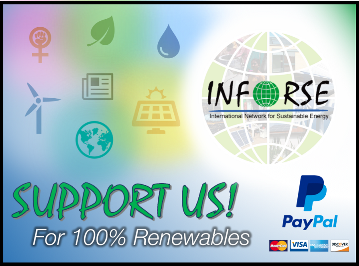|
|
|
|
|
|
|
|
|
|
|
|
|
|
|
|
|
|
|
|
|
| Follow Us: |
| Will Europe Choose Sustainability? | |
| Editorial | |
|
From the start of the discussions of sustainable development, it has been clear that the industrialised countries have a primary responsibility to reduce consumption. The Brundtland report speaks about a need for almost 50% reduction of energy consumption in the industrialised countries, i.e., Europe (East and West), North America, Japan,and Australia. All major environmental NGOs have worked for a goal like this for the last decade, and numerous reports have documented not only that it is possible, but that the costs, if any, are small compared to the environmental costs of continued unsustainable development. In this light, it is appalling to see how little has happened on the international level. The UN still has a major organisation for promotion of nuclear power and none for renewables or for energy efficiency. The Kyoto meeting was not successful in achieving an agreement on the greenhouse-gas reductions in industrialised countries, which are necessary for sustainable development. And the EU countries, which were viewed in Kyoto as the progressive block, are opening the door to buying 'hot air' from Central and Eastern Europe to meet their modest reduction target of 8% by 2010. However, some progress can be seen on the international level: The countries around the Baltic Sea are about to agree upon a vision for sustainable energy that reaches further than previous international statements. The Environment Ministers of Europe and North America are about to agree upon a guideline for energy conservation, including proposals for new international cooperation in the field. Both are new developments on the international scene, respectively leading to higher goals for emission reductions and a better international framework for sustainable energy development. Both initiatives have been developed with extensive NGO participation, and will need support from the civil society to be developed into successes going beyond ministerial declarations. For INFORSE-Europe, it has been a major activity of the last year to follow the progress of these processes. And we intend to follow them further, in cooperation with the many other networks and organisations involved in the Environment for Europe process, culminating in the 4th Pan-European Environmental Ministers' meeting this June in +rhus, Denmark. We hope that the countries will use this opportunity to go a step further than the previous agreements. If they do that, we will join the follow-up to ensure that the agreements are realized in practical international co-orperation and national policy. |
|

| |
| Published in Sustainable Energy News |
|
|
Go back to main page of ISSUE #22, Sustainable Energy News (16 pages) (1998-09-01) |
|
| Contact | |
| |
INFORSE Secretariat Klosterport 4F, 1. floor DK-8000 Aarhus C Denmark Phone: +45 86 22 70 00 Twitter: INFORSE_org Facebook: INFORSE Web: inforse.org E-mail: ove@inforse.org |
